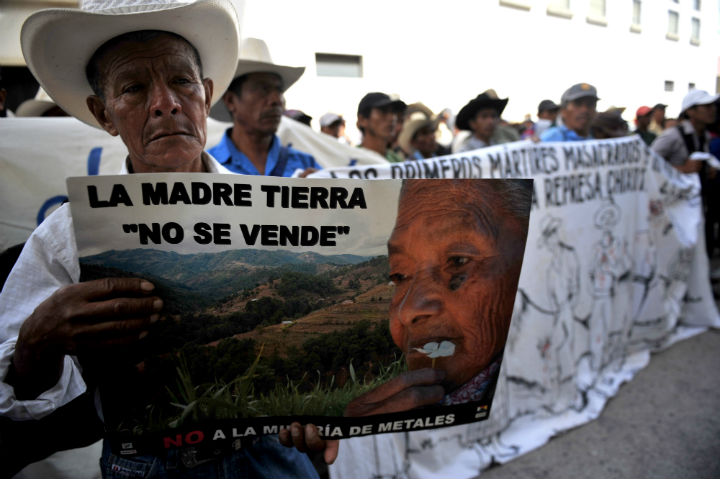*CORRECTION: A previous version of this story incorrectly attributed a report to the Inter-American Commission on Human Rights (IACHR). The report was submitted to the IACHR by The Working Group on Mining and Human Rights in Latin America, a group comprised of non-government and civil society organizations.

A U.S. think tank has called Canada’s mining sector to task for the “collateral damage” that goes hand-in-hand with mineral extraction in Latin America.
Canadian companies control as much as 70 per cent of mining operations in Latin America, but are reaping profits while leaving local communities to deal with an array of problems in the aftermath, according to an article this week from the Council on Hemispheric Affairs (COHA).
The COHA article published Wednesday argued Canadian extraction companies such as Vancouver-based Goldcorp Inc. among those who operate in the region and whose mining practices are said to have had negative environmental, social and economic effects.
READ MORE: Calgary-based mining company suing Costa Rica for more than $1 billion
READ MORE: Costa Rica investigating Canadian mine approval, trials pending
“It’s been a big issue for a few years now and there haven’t been a lot of news or reports on it,” Krishnan told Global News.
The article, Canadian Mining in Latin America: Exploitation, Inconsistency, and Neglect followed an earlier report submitted to the the Inter-American Commission on Human Rights (IACHR), written by the Working Group on Mining and Human Rights in Latin America, that linked Canadian mining operations to forced displacement, violence, and disregard for indigenous rights, among other claims.
The Working Group on Mining and Human Rights in Latin America is comprised of several non-government and civil society organizations.
The the Working Group report, Krishnan said, discussed how “there is a weak legal system in Latin America that creates conducive conditions to all of the exploitation that Canadian mining operation undertake.”
The Working Group report also suggested the Canadian government’s foreign policy in developing countries is fundamentally tied to the ambitions of the mining sector.
Representatives of the mining industry took issue with some of Krishnan’s reporting or at least the timeliness of some references to violations committed by or in favour of the Canadian mining industry, saying the sector has changed significantly over the years.
READ MORE: Romanians protest Canadian-owned gold mining operation
Pierre Gratton, president and CEO of the Canadian Mining Association (CMA), said he found the tone and recommendations of Krishnan’s article “predictable” and said there wasn’t much new information in it.
Krishnan referenced incidents in the late 1990s, such as land acquired “fraudulently… where sales are made without any information on real asset prices or the impact of mining activities on future property values.”
She referenced Marlin Mine project, located near the rural, largely indigenous Guatemalan communities of San Miguel Ixtahuacán and Sipakapa, and the purchase of land for the equivalent of just US$500. Though owned by GoldCorp’s Guatemalan subsidiary, Montana Exploradora de Guatemala, Goldcorp was not the mine’s owner at that time.
Goldcorp Senior Vice-President of Corporate Affairs Brent Bergeron said researchers and groups opposing mining development have no interest in working with the sector.
“There are a lot of people who have just taken the position that they are against mining altogether, regardless of the benefits that the industry can actually have for different types of communities,” he told Global News.
“It’s very difficult for us to try to convince them,” he said. “So, we don’t work in that manner. We work with the communities where we operate, to try and maximize the amount of benefits that can be derived from our operations.”
Speaking further to Goldcorp’s operations in Guatemala specifically, Bergeron said the company completed its own human rights impact assessment and “moved forward” on implementing recommendations from the communities.
Goldcorp, on its website, dispels what it calls “myths” about the Marlin Mine project — addressing land acquisition, claims about disrespecting human rights and the use of “intimidation tactics to silence vocal opposition to the mine.”
Like Gratton, Bergeron said he questions the timeliness of the COHA article and said it represents “an opinion of the author of the report and does not really reflect the reality of what’s going on in different countries and in our industry.”
Gratton said the COHA article doesn’t paint an accurate picture of the “safeguards” now in place to protect the environment and human rights, but he did find some common ground in one aspect of Krishnan’s report.
“If there’s one aspect of this paper that I agree with at one level is that it puts a focus on Latin American governments themselves doing a better job of… putting in place and enforcing appropriate laws,” Gratton said.
READ MORE: Colombian labour union accuses Canada’s Pacific Rubiales Energy of intimidation
Jamie Kneen of Mining Watch Canada tells a much different story about Canadian mining operations and the governments Canadian corporations deal with to secure their projects.
While Canadian companies claim to practice corporate social responsibility in the countries where they operate, such as building infrastructure or making financial donations, Kneen questioned how responsible those companies are in dealing with governments that don’t always put their citizens’ best interests first.
“If you’re operating in a place where the government can’t be trusted to build schools and roads for people, then is that really a place where you can ethically be doing business,” he said. “If you’re operating in a country where you work with the local police and they end up shooting and killing and raping people, is that really an ethically tenable situation?”



Comments